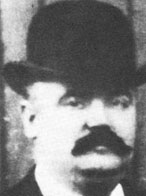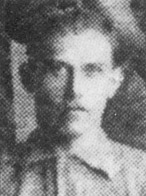On 6th May 1915 Tom Watson, Liverpool FC’s manager of 19 years who had guided the club to two league championships and an FA Cup final, died after a short illness.
Watson had already won three championships with Sunderland when he was appointed in 1896. He made some important changes to the way the club was run, including the introduction of red shirts to replace the blue and white quarters. From his home in nearby St Domingo Vale, he oversaw a more than satisfactory first season, with the Reds finishing fifth in the table, having been promoted the season before.
After slipping back to ninth Watson made a bold transfer market move in 1898, paying Hibernian £350 for centre half Alex Raisbeck who had been on loan at Stoke. The centre half was a commanding figure on the field and almost helped the side to a first league title, only for the Reds to crash 5-0 on the last day of the season to Aston Villa, who became champions instead.
Two years later Liverpool did become champions for the first time, a John Walker goal confirming their supremity in the last game of the season away to West Bromwich Albion. On arrival back at Central Station a band welcomed them by playing The Conquering Hero but fans who turned out to greet the squad didn’t risk carrying Watson’s rotund figure on their shoulders in the same way they did with the players.
Just three years later the Reds were relegated but Watson took them straight back up to the top flight, then Liverpool became the first club to win the league immediately after promotion. Such a feat looked very unlikely in the autumn when they suffered five defeats in their first eight games. Watson though replaced veteran keeper Ned Doig with Sam Hardy, and his presence helped steady the defensive ship, an eleven game unbeaten run taking them to the top of the table at Christmas.
The title was secured with a game to spare on Easter Monday. 1,000 fans travelled on a special train to Bolton knowing a win would be enough but although the Reds lost 3-2 they were given a helping hand by Watson’s old club Sunderland, who beat nearest challengers Preston 2-0. By now Watson was living even nearer to the ground in Anfield Road in a house that was demolished when the Kemlyn Road stand was extended in the early 1990s.
In 1910 Watson took Liverpool FC on their first tour outside the British Isles when they visited Denmark and Sweden. There were no journalists accompanying them and people at home had to rely on letters and telegraphs sent by Watson for news. In addition to describing the style and standard of play, he wrote how the players had gone on the ale with Manchester City’s touring squad and that he enjoyed seeing ladies at games wearing summer dresses.
In 1914, after guiding the Reds to their first FA Cup final where they lost 1-0 to Burnley, Watson took the players to Scandinavia again but this time he left it to midfielder Tom Fairfoul to write the letters home. These included tales of Watson getting pissed with them and singing, and the squad being met by a crowd of 5,000 wellwishers at Stockholm station.
War broke out a few days before the start of the next season and there was controversy about organised football competition continuing. Watson was fierce about criticism though, emphasising that the players had army training, recruitment agents were at games and attendance was good for the morale of wounded soldiers. By the end of the season though it did look almost certain that there would be no resumption of the Football League until hostilities were over. He didn’t know it at the time, but Watson’s last act as Liverpool manager was to hand Everton the title, courtesy of the Reds beating second placed Oldham 2-0 at Boundary Park.
The Oldham game took place on 24th April but just a week later he was battling pleurisy and pneumonia at his home, which was now on Priory Road. There was a brief improvement but by 6th May things weren’t looking good. Bee’s update in the Liverpool Echo of that afternoon said that he had spent a bad night. Later editions of the paper then brought the terrible news that he had died and realistically there had never been any hope for him as his constitution was so weak.
Watson was just 56 years old, leaving a wife and two sons. His funeral at Anfield Cemetery took place the following Monday and was attended by representatives of a number of English and Scottish clubs. Today his grave there remains unmarked although funding seems to have been agreed between Watson’s descendants, Liverpool and Sunderland, so that issue should hopefully be resolved soon.





